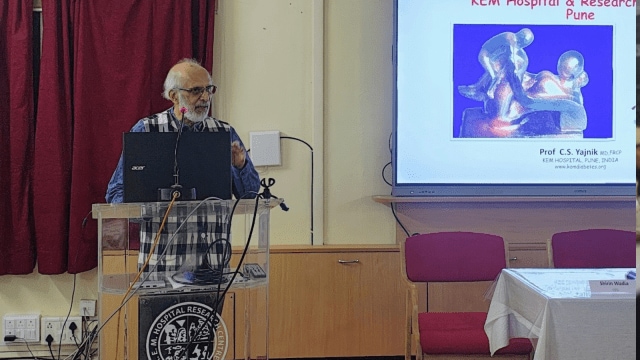Click here to join Express Pune WhatsApp channel and get a curated list of our stories
Type-5 diabetes linked to undernutrition now in spotlight; time to take action, says top researcher
Eminent diabetes researcher Dr Chittaranjan Yajnik from KEM Hospital, Pune, has described a newly recognised form of diabetes — Type-5 — predominantly affecting undernourished and low-BMI individuals.
 A new diabetes form ‘Type-5’ has been identified among undernourished populations, as per a global consensus led by Pune’s Dr Chittaranjan Yajnik. (Express Photo)
A new diabetes form ‘Type-5’ has been identified among undernourished populations, as per a global consensus led by Pune’s Dr Chittaranjan Yajnik. (Express Photo) If Type-2 diabetes demands that people eat less and walk more, then Type-5 diabetes poses novel challenges, said eminent diabetes researcher and Head of Diabetes Unit of KEM Hospital, Pune, Dr. Chittaranjan Yajnik on Monday.
In a recent paper published in The Lancet Global Health, Dr Yajnik (who among other authors) said that an unusual form of diabetes is being seen among undernourished populations. “There is an urgent need for systematic documentation and deeper investigation into its complex causes and appropriate treatment strategies,” he said.
The Lancet report follows an international consensus meeting held in Vellore, India, in January 2025, where experts proposed the term ‘type-5 diabetes’ to distinguish it from the more common type 1 and type 2 diabetes, as well as other rare genetic and secondary forms.
Type 5 diabetes patients broadly, are from socio-economically deprived populations (LMICs and rural communities), have low BMI, are insulin-deficient and have high glucose levels but do not develop ketoacidosis (unlike type 1 diabetes). On specific testing, they are insulin-sensitive. They do not show the major genetic mutations of diabetes and their pancreas doesn’t show stones and damage.
The International Diabetes Federation recognised Type 5 diabetes as a subtype of diabetes during their recent meeting in Bangkok (April 2025) and promoted establishing a working group to further investigate this variety of diabetes.”The introduction of this new classification aims to draw attention from global health stakeholders and stimulate further research into this neglected condition. More research is needed to define the genetic basis of this subgroup,” Dr Yajnik said.
Ahead of this year’s World Diabetes Day (Nov 14) with the theme ‘Diabetes Across Life Stages’, the expert in an interaction with media persons also observed that this recognition will help improve acceptance of the condition and attract funding for research. “India is expected to make a substantial contribution to this activity,” he added.
“With undernutrition re-emerging globally due to climate change, migration, famine, and conflicts, Type-5 diabetes may assume far-reaching implications. Its proper documentation and research could pave the way for preventive strategies and tailored treatments that address both ends of the nutrition spectrum,” said Dr Yajnik. Shririn Wadia, CEO KEM Hospital and Dr Rakesh Shah, Chief OperatingOfficer, KEM Hospital were also present on the occasion.
‘ClubOne KEM’ empowering lives, using tech to enhance patient support
ClubOne KEM, a unique patient-support initiative dedicated to enhancing the quality of life of individuals living with Type 1 diabetes, also has more than 1,700 Type 1 diabetes patients. “This occurs most commonly in children and adolescents. They need multiple daily insulin injections to maintain a glucose level in the proper range and would not be able to survive without insulin treatment,” Dr Smita Dhadge, diabetologist and sleep medicine expert at the unit said.
The Madhuraksha mobile application was developed specially for Type 1 Diabetes patients and their families. It is available free on Android and iOS. This innovative app serves as a “pocket diabbuddy” the patients. “With over 2,000 downloads and nearly 800 active users, it provides vital information on insulin administration, glucose monitoring, travel tips, sick day care,” Dr Dhadge added. ClubOne has also designed a special compact bag/ pouch (Diabag) which children with Type 1 diabetes can carry to school or during travel. It provides safe storage for all T1D essentials (insulin in the insulated cold compartment), glucometer, hypoglycemia management supplies, emergency contacts and others. in one place.
Click here to join Express Pune WhatsApp channel and get a curated list of our stories







